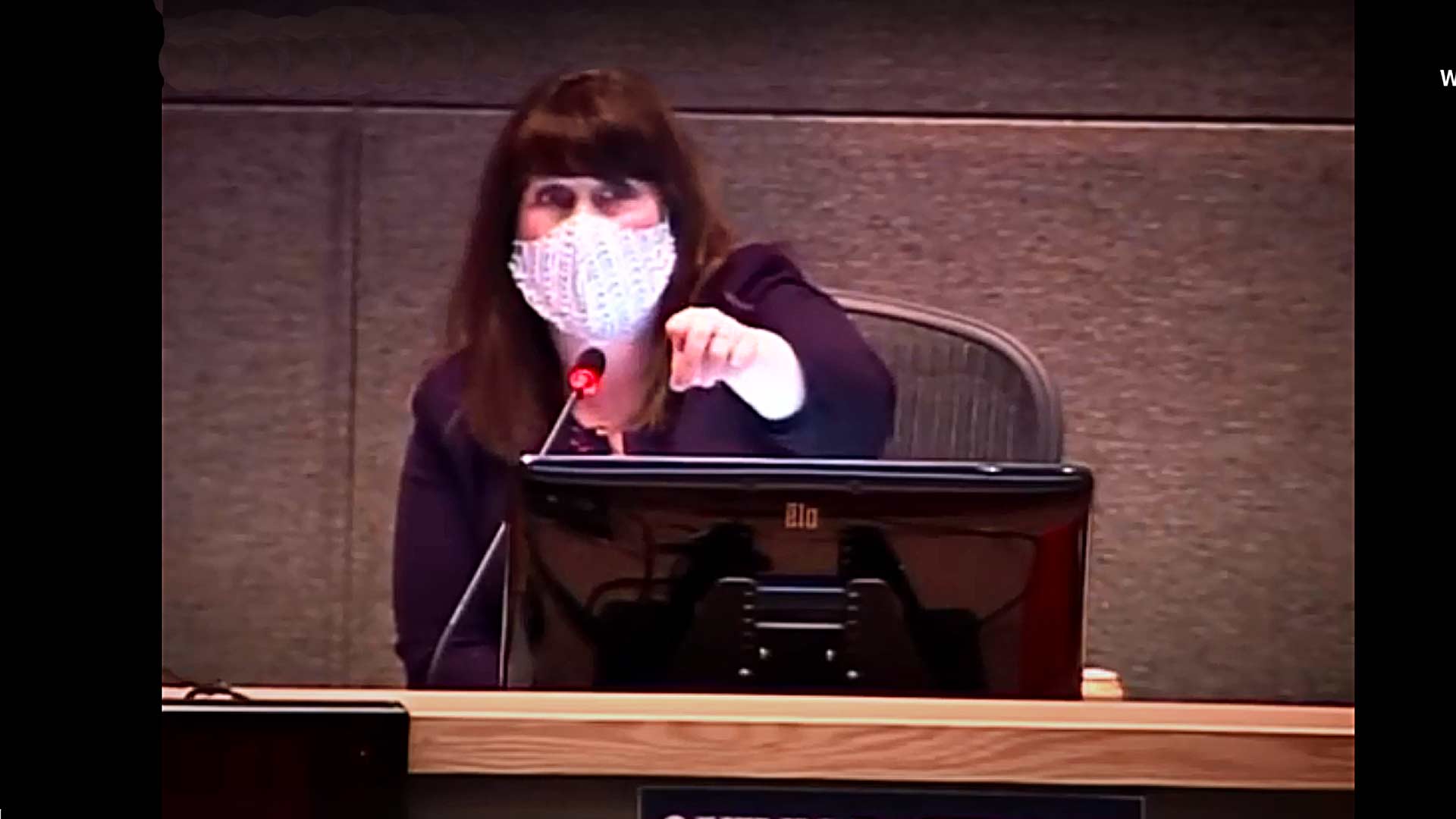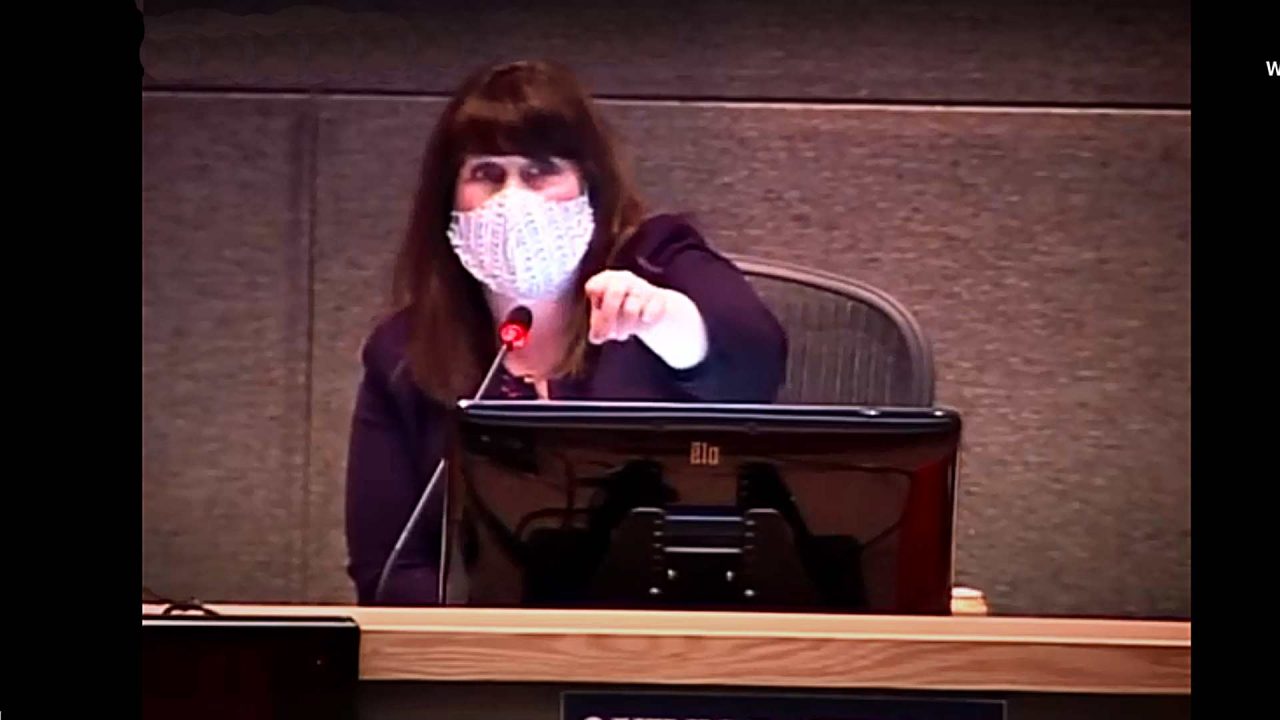
The extraordinary powers that Anchorage’s unelected Acting Mayor Austin Quinn-Davidson enjoys to impose emergency restrictions and mandates on businesses, churches, schools, individuals and other entities will likely continue unabated until at least April, and maybe beyond.

With the Assembly’s 8-2 vote on Jan. 12 to extend the declaration of emergency, struggling business will now likely continue to endure sever limitations on size capacity through the end of winter. Only Assemblywomen Jamie Allard and Crystal Kennedy voted against the extension, which could be terminated by the Assembly at any time.
Before the vote, Acting Mayor Austin Quinn-Davidson suggested that there may be an even greater need in the months ahead to continue her emergency orders – including mandatory masking, social distancing and limitations on gatherings.
First she claimed that her mandates have worked to keep case numbers down. She then suggested that her goal is to now “honor the sacrifices” the community has made by “preventing a rapid surge in cases” in the future.
Quinn-Davidson expressed her belief that she is doing right by a city that has seen roughly 70 businesses close down due to her orders.
She admitted that there is a significant drop in COVID cases and vastly increased hospital capacity, but then suggested that more troubling times may lie ahead and Anchorage can’t afford to let up.
“New strains of the virus that are believed to be significantly more transmissable are being detectable across the country,” she said of a COVID variant that originated in England.
“We do not have evidence (in Alaska) of the UK variant, yet,” she said. “But it continues to be identified in more and more states. The current vaccines are expected to be effective against this new variant but we are very concerned that this varent may spread more quickly than people are vaccinated, and could drive up cases and hospital demand quickly, before we have achieved widespread immunity. Thankfully, we know what to do – wear masks, avoid gatherings and keep physical distance from others.”
Quinn-Davidson expressed her belief that she is doing right by a city that has seen roughly 70 businesses close down due to her orders. Many will never reopen.
Quinn-Davidson accused her many critics of “vitrol and hatred.”
She mentioned all the good things she’s doing to help them, like implementing a “texting alert system” to help communicate to small businesses about new safety regulations and government handouts. She also praised her efforts to help struggling seniors get property tax exemptions, and the city’s new website that informs newly impoverished residents how to access free food.
Before the Assembly voted to extend her powers, Quinn-Davidson praised them for being able to work together “despite dissagreements that are sometimes very strong.”
Indeed, the disagreements run deep. Scores of residents continue to spend hours at each meeting criticizing the Assembly for doubling down on crippling mandates that limit some businesses (mostly local) far more than national chains like Walmart, Lowes, Costco and others. Assemblywomen Jamie Allared and Crystal Kennedy have also been critical of the mayor’s decisions.
Quinn-Davidson accused her many critics of “vitrol and hatred.”
“Among the many who come to us with genuine disagreements and profound challenges, we are also hearing more and more claims that have little connection to reality and language that describes those who disagree as enemies or worse,” she said, “This system of government works when we recognize that we are working toward the same goals, even as we vehemently disagree on how we get there.”
Even the attempt to loosen some of the acting mayor’s orders was rejected by the majority of the Assembly on Jan. 12.
The problem, however, is that many do not “recognize that we are working toward the same goals.” While no one wants a deadly virus to plague the city, many critics of the emergency orders have noted that deaths from the virus are vastly fewer than originally expected, hospitals have never been overrun and there has yet to be a post-Thanksgiving or Christmas surge as city health officials warned. In addition, the mandates have coincided with a rise in attempted suicides and drug overdoses as many are now out of work and socially deprived of basic human interactions.
Even the attempt to loosen some of the acting mayor’s orders was rejected by the majority of the Assembly on Jan. 12. They have the power to terminate any orders they deem overly burdensome and ineffective. The majority, however, seem to march in lockstep with the acting mayor’s will when it comes to mandates.
In order to begin moving out of a state of emergency, the acting mayor’s administration argued Jan. 12 that the city would need to see a 60-75% vaccination rate among residents. That poses another challenge as many Americans are leery of a quickly-approved vaccine that skipped traditional trials and testing in order to fast-track its rollout across the nation.
ALASKA WATCHMAN DIRECT TO YOUR INBOX
The reliance on vaccines to ameliorate all fears about COVID may also be ill-founded as state health officials as well as the CDC now claim that the vaccine does not necessarily prevent people from contracting or spreading the virus. They all recommend the continuance of face masks, social distancing and the avoidance of gatherings, even after vacination.
There is also a new resistance among many health officials to recognizing the long-standing consensus that herd immunity to a virus can be achieved through natural infections. Increasingly, this is seen as intolerable and the only potential solution is to create herd immunity through widespread vaccinations.
Shortly before the Assembly voted to extend the emergency orders until April, Assemblywoman Allard expressed the frustration of countless residents.
“The only way this is going to stop is when we get a new mayor,” she said. “Or not. It depends.”
Anchorage will vote to elect a new mayor on April 12.








15 Comments
Fear and Tyranny in a Dystopian future.
Bills need to be passed to stop politicians from pandemic profiteerin.
No politicians their families or originations that are associated with should be able to buy any properties or business that have had their value dropped because of the pandemic.
It won’t get done at the ballot box. The anchorage citizens just need to decide that they wont be told what to do. Nobody has any authority over you unless you freely give it to them. Sadly people in anchorage are too passive. They will get on the box car if they’re told to and wont fight back. History repeats itself. Take your vaccine or you cant be a part of our society. Well that’s when I move out into the woods and give up all the modern comforts because I WILL NOT be ruled over.
Forget this woman. Just do what you want anchorage. I don’t let anybody dictate to me
I agree with what everyone has said!!! I have one question: how are we supposed to ignore the mandates, such as to wear a mask, when we can’t get into a store to buy food without a mask? Lately, some mask Nazis at stores have given me a hassle if I don’t wear is over the nose.
As for the businesses going along with all of this (I understand why they do so but), I say that if a substantial portion of them would all open fully at the same time, and we support them, it could make a difference.
They are godless communist aligned with the communist Chinese party instituting the strangulation of Western Civilization The water is boiling and we are the frogs. Jump out and defend your Nation and Liberty or perish under these worthless mutts you have allowed into your govt .
These Vaccines are poison They cause your immune system to fight against itself,,,, Do you think Bill Gates of Hell really wants you well when his goal is de population… The sheep need a wake up kick… Communist want a weak population starved and economically strapped in poverty,,, Why cant you wake up and see what these demons are doing with this sick weapon called covid. LORD help them wake up.
They only have power if you give them power. Ignore their tyrannical decrees.
A petulant toddler accidentally stumbled in to the mayors office then wouldn’t leave.
How is it that EO’s just circumvent everything in the known legal world?
The powers given to an Anchorage mayor via an Emergency Order are overwhelming. The mayor has the ability to give no bid contracts, as her/she sees necessary, without regards to cost, in order to help alleviate the crisis causing the Emergency Order declaration. It is time our city publish in newsprint/media who has received such contracts and how much the taxpayer has been fleeced. I recommend they start with the Berkowitz and Begich deals. All Emergency Order contract recipients and dollar amounts must be published for all to see.
Just stop wearing masks and open your businesses. I’m all for the Law when it’s Lawful, Constitutional, but when their little rules get oppressive because the power goes to their heads, you gotta say so. What are they going to do? Put half the city in jail? They’re telling you through the other side of their mouth that the vaccines and masks won’t help, but herd immunity through natural infection will. So why are you obeying them when even they don’t believe their lockdowns, vaccines, and mask mandates work. Conservatives would not hold the city hostage like this. Vote for fiscally responsible and family, faith, and small business friendly people next time Anchorage! The rest of us are praying you do!
I have just said NO to chin diapers since Day One, and I have really enjoyed becoming “that guy.”
It’s my new favorite thing. More people should try it.
We are just going to need as many Mama Bears as possible to back us up when the Chi-Comms push beyond reasonable limits 🙂
Now the new tool is the installation of refreshed fear at ‘new variants’ . Fascist psychological terrorism. It is a big ‘duh’ that Corona viruses mutate and will always have ‘new variants’ . The left is latching on to terminology to do all they can to keep power snd control.
Allowing corrupted elections to stand has consequences. Buck up or take it in the mask Alaska, the choice is yours.
I have been traveling back and forth to OR since March 2020 to fix up a relatives house who died. Three trips, multiple airports, never wore a mask. Got a yellow card on Alaska Airlines for not wearing my mask, I simply Rosa Parks’d the three old flight attendants. There is a reason why the flight attendants are golden girls nowadays. As a single dad my two kids are always at their friends houses, trying to enjoy their youth. They just got back into public schools and the chi-comms have the elementary schools organized just like in Beijing: mandatory queuing everywhere, 100% masking, “Supervision” everywhere. I have never been healthier. The only scary part is how the US Fed and ANC Government has made a criminal out of anyone who does not join the bandwagon, yet we are breaking no crime….or law